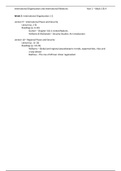International Organization and International Relations Year 1 – Block 3 & 4
Week 5: International Organization 1-2
Lecture 9 – International Peace and Security
Lecture (p. 2-5)
Readings (p. 6-10)
Gutner – Chapter 3 & 4: United Nations
Williams & McDonald – Security Studies: An introduction
Lecture 10 – Regional Peace and Security
Lecture (p. 11-13)
Readings (p. 14-22)
Williams – Global and regional peacekeepers: trends, opportunities, risks and
a way ahead
Badmus – The rise of African Union regionalism
,International Organization 1 & 2 International Organization and International Relations
Week 5 – Lecture 9: International Peace and Security
Lecture
Useful terms
- Conflict prevention: diplomatic measures to keep tensions from turning into violent conflict
- Peacekeeping: supports implementation of truce or peace agreement
- Peace-making: efforts to bring belligerents in ongoing conflict to a negotiated agreement
- Peace enforcement: use of coercive measures to restore international peace and security
- Peacebuilding: enhancing a state’s capacity in order to reduce the risk of relapsing back into conflict
- Securitisation: the social construction of an issue as a security threat (e.g. climate change)
Four fundamental questions
Security is a contested term, more clarity on the term can be provided by looking at the four
fundamental questions on security:
- What is security?
- Alleviation of threats to cherished values
- ‘Survival plus’
- Two prevalent philosophies:
- Security as a commodity (‘something you acquire’) / Security as emancipation
- Whose security?
- State?
- Human security?
- Social groups?
- Environment?
- What is a security issue?
- Different individuals, societies, states and regions construct threat agendas differently
- Dictated by the powerful?
- Debate regarding how wide to cast the net (Ebola, aids?)
- How can security be achieved?
- Who are the actors? States, individuals, private companies, IOs
- What level of threat are we willing to tolerate? No one wants maximum security
- What are the tools? Bullets? Vaccines? Aid? Ideas? Institutions?
UN Peacekeeping - One of the most well-known examples
- Directed by UNSC, the ‘realist heart’ of the UN with a liberal mission - to pool state power, to
manage global powers
- Guided by Holy Trinity of consent, impartiality and non-use of force (?); except for self-defence)
- Major changes in peacekeeping levels and mandates, in response to world developments, UN
failures and complexity of security threats
2
, International Organization 1 & 2 International Organization and International Relations
Types of changes that have occurred over the years
Traditional peacekeeping 2G Peacekeeping additions 3G Peacekeeping additions
What is security? Ultimately, the prevention of Preventing local conflicts going Protection of individuals
another World War international, fostering stability
Whose security? States/governments following a Groups, civilians in societies People, sometimes in full-blown
truce or ceasefire transitioning from conflict war zones, sometimes persecuted
by their own governments
What is a security issue? Inter-state tensions Intra-state, ethnic, societal Intra-state tensions, HR abuses,
tensions (often with inter-state humanitarian catastrophes
elements)
How is security Soldiers monitor truce / Preventive diplomacy / Peace-enforcing / Not always with
achieved? diplomats negotiate peace / peacebuilding / military, police, consent or impartiality / HR
create political space for legal and civilian components intervention / Interventions
negotiation / consent / impartial sometimes by ROs under Chapter
VII
4G Peacekeeping additions 5G Peacekeeping additions
What is security? ‘Survival plus’ ‘Survival plus’
Whose security? People, but in a wider range of Combination of all previously
ways than in earlier generations listed
What is a security issue? Problematic political institutions, Intra-state, ethnic, societal
unequal/closed economic tensions (often with inter-state
systems (things viewed as source elements)
of conflict)
How is security More robust peacebuilding Hybrid missions, simultaneous
achieved? (‘statebuilding’) / economic with ROs with specific mandates,
liberalisation / political reform / greater use of troops from Global
transitional administrations / in South, increased reluctance to
collaboration with NGOs and ROs use force, local solutions
Responsibility to Protect (R2P)
- Origins in UN failure of the 90s; mainly response to the question on ‘how should the international
community respond to a humanitarian crisis, a second Rwanda?’
- 2001: ICISS ‘Responsibility to Protect’ report outlines new concept of sovereignty
-> this broadens the concept of sovereignty: it’s not just the state’s role or sovereignty to protect its
own people, but when a particular state is unable or unwilling (or when the state is the actual
perpetrator of those crimes) to do that, the responsibility shifts to the international community
- 2005: UN endorse the ICISS report and therefore R2P as a guiding principle
- Effect of R2P apparent in more robust mandates
- Chomsky describes it as ‘humanitarian imperialism’ and a way of selling human rights to sell war:
the R2P has been misused
- Chandler (2015) argues the ‘responsibility’ has been removed from R2P
Human security
- Beyond the absence of conflict into the realms of environment, food, development, economics,
culture and more
- Still, however, analytically linked with conflict
- Source of many major conflicts in human security (e.g. Sierra Leone civil war)
- 2014: Liberian government warns Ebola outbreak could restart civil conflict
- Barnett and Adger (2007) argue climate change may trigger wars in years to come
- 2005: Kofi Annan calls for reform to reflect interconnectedness of security threats
Great powers and security - Rwanda
- April-July 1994, 800,000-1,000,000 Rwandans murdered in systematic ethnic killings
3





